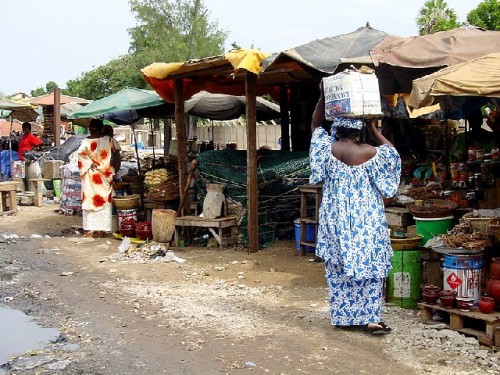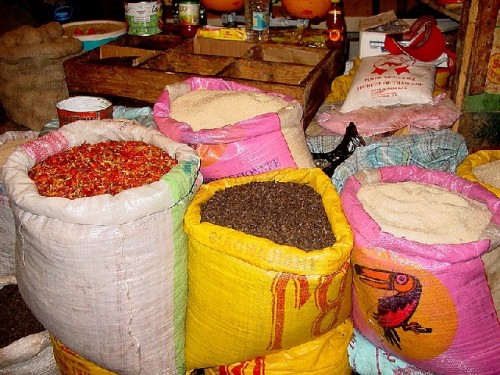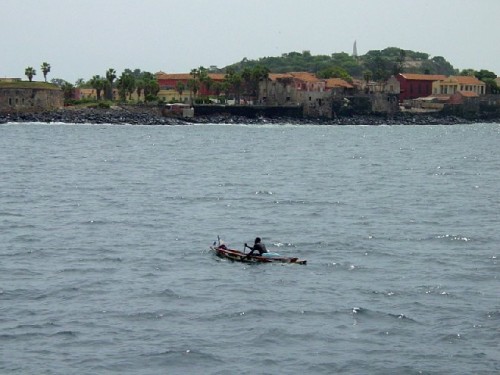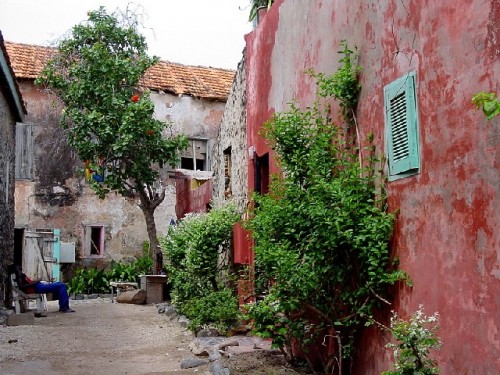Senegambia: Africa for Beginners? Part One
An Eye-opening Tour in West Africa
By: Szabolcs Mosonyi - Nov 10, 2007
Sub-Saharan Africa has always made my mind swirl with images of baobab trees, laid-back villages with mud huts, pristine beaches, faded but charming colonial architecture, a great array of flora and fauna to be spotted, and of course a bewildering mix of colors and rhythms.
However, when I and my two closest friends started planning our African vacation, we were soon faced by many challenges. First of all, we needed to choose our destination, which proved to be no small feat. South Africa offers the best of both worlds with great nature but infrastructure fit to a Westerner. However, I had already been there and was looking for a more third-world experience. Other obvious choices would have been Kenya, but we weren't too keen on going to Africa's most touristy place. There's world class game viewing in Botswana or Namibia too, but as history buffs, we opted against these countries. So then where to go? Beyond the well-trodden paths of a handful of countries, one is soon confronted by the harsh realities of Africa. Volatile situations abound. Whenever an African country is on the news, it is mostly for tribal clashes, rebels, civil war, corruption, disasters or extreme poverty. Risks can be reduced by going on a package tour but that was out of the question. We like things done our way.
Finally we found Senegal and The Gambia, both labeled as "Africa for beginners" by countless traveler forums. Yet, even here, the picture is mixed. On the one hand, given are two countries with fledgling yet stable democracies, several World Heritage sites and renowned national parks. The other side of the story is a myriad of tropical diseases, underdeveloped infrastructure, 40% literacy, 48% unemployment and Dakar's reputation for crime: the tourist brochure hardly writes itself...
A tad concerned, but full of anticipation, we were soon sipping wine aboard our flight to Dakar. Our excitement kept growing while watching the map on the display screen showing our plane inching towards Senegal. It was pitch dark when we touched down and once we've gotten out of the airport and into the city, we soon realized that the Senegalese capital was not the most welcoming place to arrive in: Heat, humidity, dust, chaos, hustlers, cars that were made well before we were born, weird smells, crickets in our room that sounded like a car alarm, and the feeling of standing out too much (in our case: three white guys, among a zillion locals).
In short, it was quite overwhelming. However, knowing that probably no African city looks friendly in the middle of the night, we did not want to rush to any premature conclusion. Yet when the day came, the situation was far from being better. Dakar looked shabby, dirty and a little scary. Looking out our hotel window, we saw way too many people lingering on the street with seemingly no place to go and nothing to do. We anticipated that we would be the ones to keep them busy for a while and we were right. No sooner did we step out of the hotel than we were surrounded by all kinds of people, all probably thinking of us as walking moneybags. And it was just the first morning. At that point we didn't have the faintest idea of what was about to come. Now I know that when I talk about Senegal, everything plays second fiddle to these people. We can call them hustlers, rabatteurs, self-proclaimed guides, street-vendors, beggars, beach boys or con artists. Yet whatever their "profession", they are bound to push the limits of even the most peaceful tourist.
They follow you everywhere, and all attempts to ditch them are futile. Should you try to escape to a hotel or restaurant, they may wait hours for you. They offer you handicrafts, jewelry, clothes, tours, cabs, girls, pot, or they just simply want your money.
The firm but polite "No, thanks" or "Non, merci" won't do the trick. Here's how the typical conversation goes. First they pretend they just want to be friends. This is where you hear "Hello, my friend", "You from which country?", "First time here?", "What you do?", "You OK?" and so on. At this point you don't want to be rude, even though you know how the conversation is going to continue. If you do try a "Thanks but I would just like to walk around, be alone, talk to my friend", they will invariably say "No problem, I just walk with you, OK? I just want to be your friend. I'm no bad guy. Gambia/ Senegal nice country, I'm good guy, I look out for you, no problem my friend".
Then comes the real thing in a variety of contexts: "Have you been to...? I know a great...", "My son was born today, we have a party, you wanna come?", "We could go out for drinks and talk, there is this nightclub..." "That bar/hotel/restaurant is closed, you could go to... instead." "I will take you to the village chief, he will bless you." "We could visit my brother/ friend/ whoever who has a ..." And so on and so forth. These activities will invariably lead to you parting with your money. So if you keep saying no and if all creative attempts fail, your "friend" will simply ask if you have some money or a gift ("cadeau" in Senegal) for him.
To be honest, I do appreciate their effort. Instead of simply robbing or threatening us, they take their time and are really creative. I also understand that Westerners are rich by their standards. Even a backpacker traveling on the cheap is rich, due to the simple fact that he is there for leisure. Yet having twenty or more conversations each day with these guys proved to be really exhausting. Mentally and physically. Keeping cool and staying friendly is even harder. They know what they want and we know what they want but it is simply impossible to cut to the chase. Like at a well-established religious ritual, there are steps to follow, unless someone is ready to be rude and disrespectful. Pretending not to understand them doesn't work either. Most of them can tell their stories in at least six languages and when we once pretended not to understand anything but Hungarian, the guy called our bluff and claimed we didn't WANT to understand him.
On our first day in Dakar, our strategy was to team up with one dude and thereby keep the others away. He actually turned out to be quite good company, taking us all over the city. We soon learned that there was much more to Dakar then what first meets the eye. We first went to the railroad station, an elegant French colonial building that was once a busy transport hub. With rail infrastructure neglected and deteriorating, there is now only one train a week, connecting Dakar to Bamako in Mali. Adjacent to the station some Malians have set up a little market, a truly African experience with a dizzying array of exotic wares and women carrying things around on their heads. We were so busy clicking away on our cameras, we remained oblivious to how the mood around us changed. We had gotten a few stares before, but when we started taking photos the people became outright hostile. First we thought all the yelling was just part of doing business, but then we realized people were yelling at us, some gesturing to us to stop and get out. We did, seeing that no good could come from lingering. As we were told later, to many Africans having their picture taken is a personal thing so they expect something personal in return. If you don't have a little gift for them, money will also do. However, snapping photos without permission is a strict no-no.
Not discouraged by this incident, we went on to explore Sandaga, the biggest and most
chaotic market in Dakar. It's a real visual feast with all the colorful fabrics, the beautiful handicrafts, and the plethora of spices. African tunes are played on stereos and the noise of constant chatter in Wolof (the local vernacular) fills the air. Our local guide was a real asset there, without him we could easily have gotten lost in the maze of stalls. Careful about always asking for permission before taking a photo, this time we did not stir any emotion.
We did however feel the urge to escape all the hustle and bustle, so we headed to the ferry terminal and took the first boat to Gorée, the quaintest, most laid-back and most beautiful spot in Dakar.
Just a few miles offshore, Gorée Island is a World Heritage site and one of the oldest European settlements in Africa. It is actually a picturesque little village, overlooked by a fort at the northern tip of the island. As we roamed the narrow car-free streets, we were surrounded by bougainvilleas, colonial houses with wrought-iron balconies and palm trees swaying in the breeze. Children were playing in the shallow waters of the tiny beach, adults were chatting or napping under the shade of palms. A haven of peace indeed. It was hard to imagine that this idyllic little island was once a busy center of trade and also had the dubious honor of being a slave shipment point. The House of Slaves (Maison des Esclaves) is the only reminder of the grim past, featuring dark dungeons where people would languish for months before being shipped to America.
Having been refreshed in this beautiful oasis of tranquility, we headed back to Dakar proper, only to battle traffic and engage in a few more conversations without ending up with less money than before. The hustler-record of the day was set at the modern main square, Place de l'Independence, where no less than six people approached us. We were never alone for more than a few seconds. When we finally returned to the hotel and washed down the day with a bottle of excellent local Gazelle beer, not even the crickets could keep us awake.











